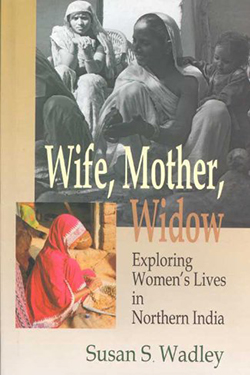Wife, Mother, Widow: Exploring Women’s Lives in Northern India
Susan Snow Wadley
Orient Blackswan, December 2008

The essays in this volume, based on forty years of research in Karimpur in western Uttar Pradesh, study the impact of increased rural prosperity, gains in education, and urban influences on the lives of women in rural north India. The initial chapters examine the changes in the economic system and demographic patterns in the village over the last 70 years, which show significant improvement in the economic condition of the people, child mortality and life expectancy, and education. While these changes imply greater mobility, decision-making powers and increasing ages of marriage for some women, others have been adversely affected, facing the double burden of poverty and caste discrimination due to the discontinuation of the jajmani (patron-client) system and the breaking up of joint families. A later essay focuses on the growing disparity in the female-to-male ratio, an issue of vital concern in India. Frequent interactions with the urban community has led to better awareness of biomedicine and improved general health, but it has also opened up new challenges as families shift from female infanticide to female foeticide. The remaining chapters describe the day-to-day realities of women's lives in a patriarchal rural community-rituals, family dealings, marriage and widowhood. But they also present hitherto overlooked or little known information such as the common practice of remarriage of widows of lower castes, or widows of higher caste actively participating in village politics. The last two chapters highlight the impact of modern lifestyles including fashion and clothes on young women in rural India, providing them the raw materials to forge new identities and traditions.